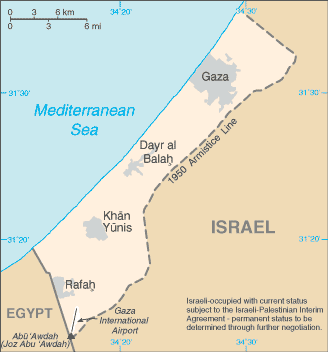Persecuted church list...
Map:

Overview:
The Israel-PLO Declaration of Principles on Interim Self-Government Arrangements (the DOP), signed in Washington on 13 September 1993, provided for a transitional period not exceeding five years of Palestinian interim self-government in the Gaza Strip and the West Bank. Under the DOP, Israel agreed to transfer certain powers and responsibilities to the Palestinian Authority, which includes the Palestinian Legislative Council elected in January 1996, as part of the interim self-governing arrangements in the West Bank and Gaza Strip. A transfer of powers and responsibilities for the Gaza Strip and Jericho took place pursuant to the Israel-PLO 4 May 1994 Cairo Agreement on the Gaza Strip and the Jericho Area and in additional areas of the West Bank pursuant to the Israel-PLO 28 September 1995 Interim Agreement, the Israel-PLO 15 January 1997 Protocol Concerning Redeployment in Hebron, the Israel-PLO 23 October 1998 Wye River Memorandum, and the 4 September 1999 Sharm el-Sheikh Agreement. The DOP provides that Israel will retain responsibility during the transitional period for external and internal security and for public order of settlements and Israeli citizens. Direct negotiations to determine the permanent status of Gaza and West Bank began in September 1999 after a three-year hiatus, but were derailed by a second intifadah that broke out in September 2000. The resulting widespread violence in the West Bank and Gaza Strip, Israel's military response, and instability within the Palestinian Authority continue to undermine progress toward a permanent agreement. Following the death of longtime Palestinian leader Yasir ARAFAT in November 2004, the election of his successor Mahmud ABBAS in January 2005 could bring a turning point in the conflict.
The People:
Population: 1,376,289
note: in addition, there are more than 5,000 Israeli settlers in the Gaza Strip (July 2005 est.)
Age structure:
0-14 years: 48.5% (male 342,186/female 325,899)
15-64 years: 48.8% (male 342,927/female 329,354)
65 years and over: 2.6% (male 15,036/female 20,887) (2005 est.)
Religions:
Muslim (predominantly Sunni) 98.7%, Christian 0.7%, Jewish 0.6%
Government Type:
N/A
Source: The World Factbook
View All Countries